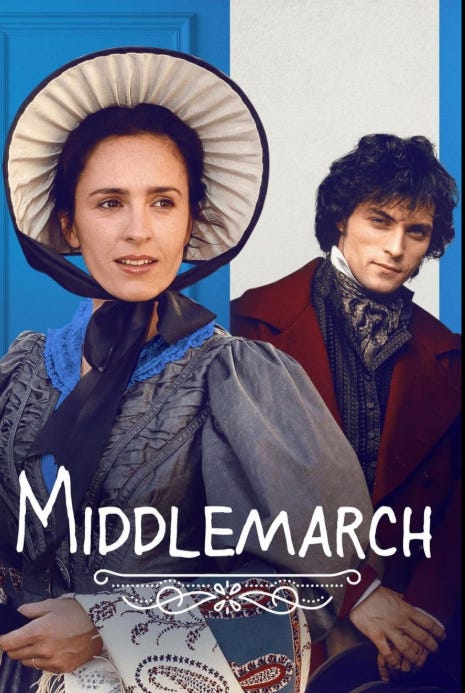In order to be able to shut up the Anglos who have been lording it over me for years for never having read THE ESSENTIAL novel of English literature - besides, the literary Substack has gone batty for it this year - I’ve finally read Middlemarch.
1) It’s deeply Christian - even at its most secular - and very particularly C of E Christian. The novel is full of C of E clergymen and it doesn’t matter that all but one (Mr. Farebrother) are silly, self-indulgent, conformist, or pompous: we judge them against Christian ideals as inadequate. Becoming a vicar is a well-trodden career path for listless boys of the upper middle class families in the novel. Dorothea, its heroine, is Christian through and through, determined to do good (the novel is about the obstacles on her path, some self inflicted) and as it becomes obvious in the Rome episode, suspicious of art without a higher purpose and of beauty for its own sake. “And then all this immense expense of art, that seems somehow to lie outside life and make it no better for the world, pains one.” In another conversation with the free and irresponsible Will Ladislaw, when he probes politely why she has narrowed her life down to her husband’s papers and estate, she says that she has a belief that comforts her. “That by desiring what is perfectly good, even when we don’t quite know what it is and cannot do what we would, we are part of the divine power against evil - widening the skirts of light and making the struggle with darkness narrower.” Nothing comes of her grand plans, though, as she largely (mis)directs her Christian love project entirely towards a husband. No cottages get rebuilt on her uncle’s estate, no renters’ lives improve. Her personal choices make some small scale difference (she saves a man from debt, puts in a good word for him with his terrible wife, gives up her inherited wealth for love and saves Will from aimlessness). The novel’s famous ending about unsung heroes “resting in unvisited tombs”, a dig against Carlyle’s Great Man historiography, talks of Dorothea as having incalculable positive effects on those around her. “[T]he growing good of the world is partly dependent on unhistoric acts” such as Dorothea’s anonymous goodness, and… I don’t know. This is another way the book is Christian. The good deed will have its effect one way or another, it says.

